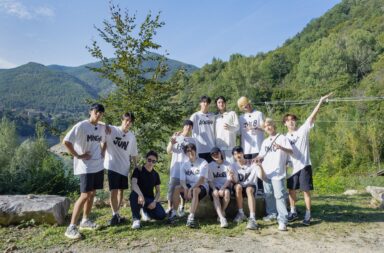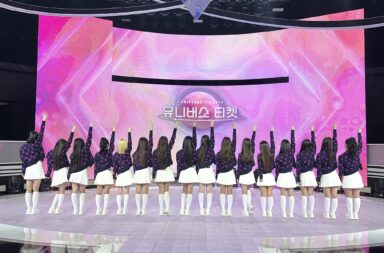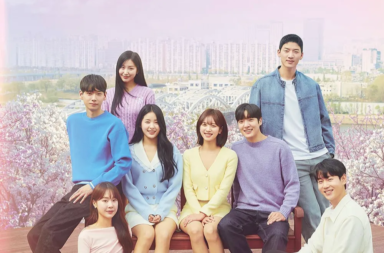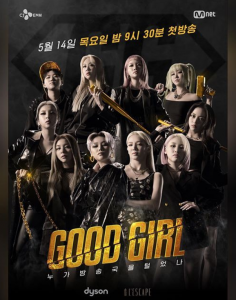
Good Girl vs Mnet, a new survival program from Mnet, seeks to challenge gender norms and move in a new direction. Following the recent Produce 101 scandal, Mnet has undergone rebranding attempts with a reformed logo and new competition programs, with mixed results. While recurring programs such as Countdown have continued as usual, the new competition programs that have come out of the company seem to be moving in new directions. With vote manipulation charges and subversive evil editing claims still fresh in the public and companies’ minds, Mnet continues to assert themselves as the foremost producer of K-pop content in the market even amidst a loss of trust and scandal.
With this being said, new programs such as Queendom and more recently, Good Girl vs Mnet, could signal a rebranding or reform of competition and survival program culture itself. Good Girl vs Mnet picks up where Queendom left off, taking on controversial social topics and pushing towards shattering traditional gender expectations for women in the industry.
Queendom, which ran its first season from August 29th — October 31st of 2019, featured Mamamoo, Oh My Girl, Lovelyz, (G)I-dle, AOA as well as soloist Park Bom of 2NE1. The show featured full group performances as well as special solo, unit, and collaborative unit stages between different groups’ members. The concept for the show was relatively simple, but the superior performances managed to amass millions of YouTube views and keep fans hoping for a second season.
The artists featured in the first season experimented with new concepts, collaborated between groups, and covered each other’s songs. While there was a competition and survival element to the show as idol reality TV often does, the members of the various groups also demonstrated growing chemistry and camaraderie, all the while showcasing remarkable performance skills. With female empowerment, big mainstream names, and a dive into more taboo concepts for female idols (like scary Halloween-esque visuals), Queendom proved that Mnet was willing to experiment with subverting typical reality TV expectations and fostering organic camaraderie aside competition.
The more recent program, Good Girl vs Mnet, picks up where Queendom left off. However, rather than competing for top spots, artists in Good Girl team up to compete and undergo missions for “flex money” that is “robbed” from the channel itself. Artists work together to collaborate across genres and with different backgrounds, resulting in powerful, entertaining, and fresh performances. Popular artists Hyoyeon from Girls’ Generation, Cheetah, Ailee, Jamie, Lee Young-ji, and Kard’s Jiwoo are joined by Sleeq, Queen Wa$abii, CLC’s Yeeun, and Yunhway. The show provides a rare opportunity for artists from vastly different personalities and backgrounds to collaborate, rather than ruthlessly compete. It has so far aired four episodes with a growing number of celebrity guests such as Weki Meki, Yubin, Giriboy, and Ravi.
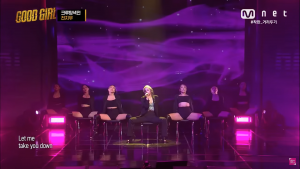
Despite the good girl title, the women in the show are displayed as bad girls: headstrong, loud, and determined to stand up for what they want. One of the hosts for the show, DinDin even joked that he was stressed at the onset of the show because “there’s not even a moment of quiet” as the cast is overall bossy and boisterous, even refuting him at times. This openly bossy, powerful imagery breaks with long held gender norms both in South Korea (as well is in most of the world) where women can be strong, but are often still expected to be submissive and polite rather than assertive. In other shows such as Queendom, or in promotions that display a girl crush concept, women are powerful but still are held by often unspoken cultural norms, such as submitting to a senior rather than speaking on one’s opinion. Good Girl shatters these expectations, praising female strength and ambition rather than criticizing it.
Throughout the show, artists grapple with taboo subjects and present themselves in ways that have even the spectators and other artists gasping and slack-jawed. Queen Wa$abii twerks in a skimpy on-stage outfit while cursing almost every other word, Jiwoo eroticizes the stage by dancing rather intimately with another female dancer, and Sleeq brings awareness to LGBT+ rights in her original track “Here I Go.” Not only are the performances exciting, musically adept, and empowering, the artists and producers have been afforded a seemingly remarkable amount of autonomy.
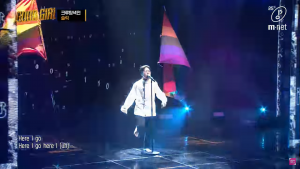
Not only are these women taking on tough topics, but some are even deliberately rebranding themselves in the public eye. Jamie especially has expressed a desire to deliberately separate herself from her given name and image of Jimin in favor of her English name Jamie. Others like Queen Wa$abii and Sleeq reinforce their presence and meet the expectations for satisfying, confident performances. Sleeq won the Underrated Album of the Year award at the Korean Hip Hop Awards in 2017, but has remained relatively unknown in the mainstream. Queen Wa$abii, an underground rapper, has been steadily gaining popularity partially due to her crass, give zero f’s attitude and lyrics. These performances make the viewers feel as if they are being exposed to the most authentic, raw versions of the artists, uncensored by industry standards. However, it is often difficult to discern if this perception is truly authentic or a product of smart producing and editing.
One of the other highlights of the show that cannot be emphasized enough is the positivity and chemistry of the competitors both on and offstage. One of the most exciting collaborations so far has been Sleeq and Hyoyeon’s cover of “Blinding Lights” by The Weekend. The performers cutely dance with each other onstage, stealing overdramatic smolders to the audience, while the other women look along in casual clothes and goofily vibe along to their performance. For this performance, there is no large audience; the performances are relatively intimate for just a small group watching, and the other women cheer and scream for them throughout the performance. This stripped-down show model allows artists to not only focus on their performances, but to build intimacy and camaraderie between each other in a more relaxed setting.
In a society where women and non cis-gendered individuals are still often faced with differing standards of how to look and act, income inequality, and in extreme cases, discrimination, this show is a simultaneously sobering and empowering representation for women and LGBT+ individuals all over the world. Whether this show is in response to Mnet’s rebranding attempts or broader socio-cultural shifts, no one can argue that it stands out from other programs on air. Good Girl makes space for every loud woman who has ever been silenced or stilled, representing and furthering feminist ideals in a positive, fun, musically fulfilling way.
(YouTube [1][2][3][4][5][6], Naver, KoreaTimes, Forbes. Images via Mnet)
